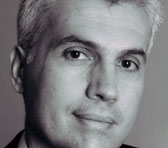25 June 2008
The Children’s Bach
Andrew Schultz on his new opera
 Image: Andrew Schultz
Image: Andrew Schultz © Robert Fretwell
Despite its name, Helen Garner's novel The Children's Bach might seem an unlikely book on which to base an opera. Nobody dies, the action is subtle, housework is a major theme, and much of the drama is internal.
But this is partly what attracted composer Andrew Schultz. 'I thought it would be completely different from anything else I had done before', he says.
That, and the fact that the novel is full of music. 'This triggered a whole range of possible approaches – it was as if the music was generating the opera rather than the other way round.'
In Garner's novel, the routine of Athena and Dexter's ingenuous relationship is unsettled by the arrival of a friend from Dexter's past. The intrusion of cynical Elizabeth, her glamorous rock-star lover Philip, and lonely sister Vicky, challenges the domesticity of the couple's steady existence, much of which centres around looking after their autistic son, Billy.
The way in which each character relates to music is telling. The blurb for the novel says 'music … means something different to each of them: to Philip and Elizabeth, work and money. To Vicki, simple entertainment. To Dexter, a key to the past. To Athena, the private hopeless toil and exaltation. And to Billy, the troubled boy, music is the one ordering principle in a world screaming chaos.'
When asked about his relationship with music, Andrew Schultz says he identifies most closely with the children in the novel – the relationship is constant and all-absorbing.
'There are times,' he says, 'when all I can think about is what the next note should be.'
'There are times when all I can think about is what the next note should be.'The period during which Schultz composed The Children's Bach was particularly intense; librettist Glen Perry gave Schultz the final version of the libretto in June last year, and the opera was completed approximately seven months later. 'I think this is the most amount of music I've ever written in such a timeframe', he says.
But even if writing an opera while working as Dean of the University of Wollongong's Faculty of Creative Arts was exhausting, Schultz believes the pressure had a positive effect on his work. 'In writing such a large work it is very easy to lose continuity. But writing it through from beginning to end, and then building that up, I think, is the best way to do it. Whatever faults there may be in the work, I think it does sound extremely unified.'
Another challenge in writing the work was balancing the competing demands of character, drama and music. While the libretto offered a blueprint for the opera, this was overlaid by Schultz's own musical structure; creating a constant interaction. 'You have these essential musical structures unfolding at the same time as the drama – and the music wants to go in one direction, whilst the libretto provides a dramatic thread.'
The opera begins as very much an ensemble piece. Each character's themes are clearly introduced, as if in a fugue. But the story gradually focuses in on Athena, and her desire to do something different in her life. Athena's feelings are reflected in her periodic attempts to learn the piano: ranging from being contented to slowly persevere, to the frustration of being trapped by her own limitations.
While music from The Children's Bach is a constant presence in both the book and the opera, Schultz uses only one direct quotation. As the adults become increasingly wrapped up in their own emotional lives, Billy puts his energy into learning the piano, and his surprisingly rapid improvement goes almost unnoticed. Towards the end of the second act, however, as he plays an excerpt from a two-part invention by Bach, his achievements come suddenly into focus.
Musically though, this doesn't come as a surprise. Using source material from the invention for most of the second act, Schultz builds carefully towards that moment. 'Hopefully by the time you hear it, it doesn't sound like Bach at all, it sounds like Schultz: it should integrate seamlessly', he says.
Schultz first used Bach's music as a substantial framework as part of a project initiated by Luciano Berio – a collection of contemporary rewritings of Bach's The Art of Fugue. Shortly afterwards, Schultz began writing Journey to Horseshoe Bend, in which Bach's music also makes a significant contribution, particularly in marking the plot's critical turning point.
In these earlier projects Schultz found he was fascinated by the way in which the music lends itself to expansion. 'Because the harmonic process is so carefully thought out,' he says, 'it allows itself to be a starting point.'
In this piece, it is both the starting point and an end point of sorts. Without wanting to reveal exactly what happens, it is in the beauty of the counterpoint, with its sequential harmonies and incidental discord, that Athena finds a resolution of sorts.
Performance Details
The Children's Bach
Chamber Made Opera, Friday 20 June to Saturday 5 July
Music: Andrew Schultz
Libretto: Glen Perry
Direction: Chris Kohn
Venue: Merlyn Theatre, The Malthouse, Melbourne, VIC
Info: www.chambermade.org.au
Further Links
Andrew Schultz (www.amcoz.com.au/composers/composer.asp?id=171)
Children's Bach - review in RealTime (www.realtimearts.net/article/issue86/9098)
© Australian Music Centre (2008) — Permission must be obtained from the AMC if you wish to reproduce this article either online or in print.
Subjects discussed by this article:
- Andrew Schultz (Interviewee)
- children's Bach, op. 74 by Andrew Schultz and Glenn Perry
Rhiannon Cook has been involved in the new music community as a composer, teacher and writer. Now working in social policy, she continues to contribute as a freelance writer.
Comments
Be the first to share add your thoughts and opinions in response to this article.
You must login to post a comment.